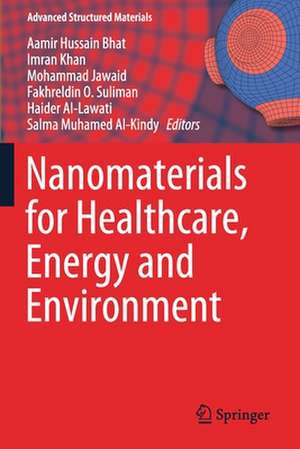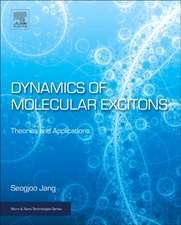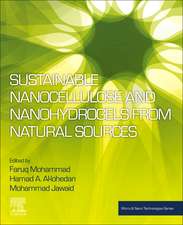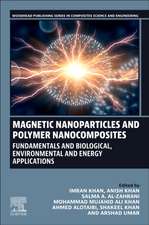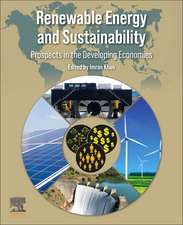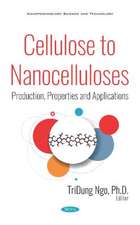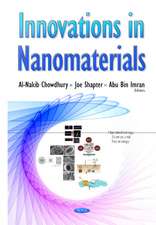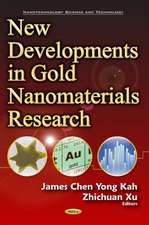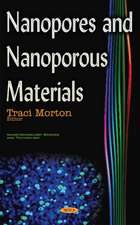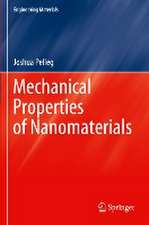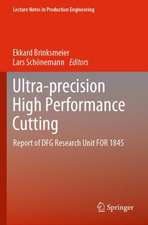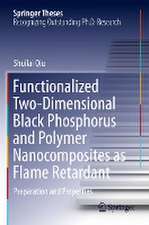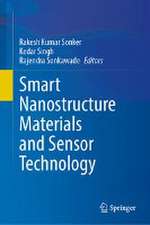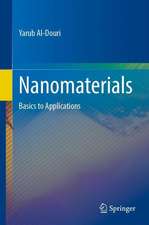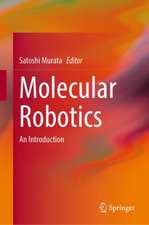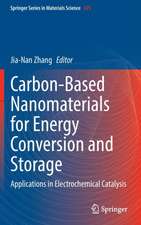Nanomaterials for Healthcare, Energy and Environment: Advanced Structured Materials, cartea 118
Editat de Aamir Hussain Bhat, Imran Khan, Mohammad Jawaid, Fakhreldin O. Suliman, Haider Al-Lawati, Salma Muhamed Al-Kindyen Limba Engleză Paperback – 30 aug 2020
Further, the book pursues a holistic approach to nanomaterial applications by taking into consideration the various stakeholders who use them. It explores several applications that could potentially be used to improve the environment and to more efficiently and cost-effectively produce energy, e.g. by reducing pollutant production during the manufacture of materials, producing solar cells that generate electricity at a competitive cost, cleaning up organic chemicals that pollute groundwater, removing volatile organic compounds (VOCs) from the air, and so on. Given its scope, the book offersa valuable asset for a broad readership, including professionals, students, and researchers from materials science/engineering, polymer science, composite technology, nanotechnology, and biotechnology whose work involves nanomaterials and nanocomposites.
| Toate formatele și edițiile | Preț | Express |
|---|---|---|
| Paperback (1) | 694.55 lei 6-8 săpt. | |
| Springer Nature Singapore – 30 aug 2020 | 694.55 lei 6-8 săpt. | |
| Hardback (1) | 948.29 lei 6-8 săpt. | |
| Springer Nature Singapore – 30 aug 2019 | 948.29 lei 6-8 săpt. |
Din seria Advanced Structured Materials
- 18%
 Preț: 949.90 lei
Preț: 949.90 lei - 18%
 Preț: 1011.27 lei
Preț: 1011.27 lei - 18%
 Preț: 1014.28 lei
Preț: 1014.28 lei - 18%
 Preț: 1109.16 lei
Preț: 1109.16 lei - 18%
 Preț: 1034.17 lei
Preț: 1034.17 lei - 15%
 Preț: 713.69 lei
Preț: 713.69 lei - 18%
 Preț: 1007.35 lei
Preț: 1007.35 lei - 18%
 Preț: 899.21 lei
Preț: 899.21 lei - 18%
 Preț: 1116.26 lei
Preț: 1116.26 lei - 18%
 Preț: 1120.99 lei
Preț: 1120.99 lei - 18%
 Preț: 785.55 lei
Preț: 785.55 lei - 18%
 Preț: 894.46 lei
Preț: 894.46 lei - 18%
 Preț: 1222.01 lei
Preț: 1222.01 lei - 18%
 Preț: 993.12 lei
Preț: 993.12 lei - 18%
 Preț: 792.66 lei
Preț: 792.66 lei - 18%
 Preț: 807.64 lei
Preț: 807.64 lei - 18%
 Preț: 1007.35 lei
Preț: 1007.35 lei - 18%
 Preț: 1120.18 lei
Preț: 1120.18 lei - 18%
 Preț: 1233.06 lei
Preț: 1233.06 lei - 18%
 Preț: 748.46 lei
Preț: 748.46 lei - 18%
 Preț: 1106.00 lei
Preț: 1106.00 lei - 18%
 Preț: 753.20 lei
Preț: 753.20 lei - 18%
 Preț: 780.82 lei
Preț: 780.82 lei - 18%
 Preț: 803.40 lei
Preț: 803.40 lei - 18%
 Preț: 798.18 lei
Preț: 798.18 lei - 18%
 Preț: 1123.35 lei
Preț: 1123.35 lei - 18%
 Preț: 901.64 lei
Preț: 901.64 lei - 18%
 Preț: 731.91 lei
Preț: 731.91 lei - 18%
 Preț: 947.04 lei
Preț: 947.04 lei - 15%
 Preț: 643.65 lei
Preț: 643.65 lei - 15%
 Preț: 639.25 lei
Preț: 639.25 lei - 15%
 Preț: 661.65 lei
Preț: 661.65 lei - 18%
 Preț: 953.82 lei
Preț: 953.82 lei - 15%
 Preț: 646.62 lei
Preț: 646.62 lei - 18%
 Preț: 1229.10 lei
Preț: 1229.10 lei - 15%
 Preț: 637.78 lei
Preț: 637.78 lei - 15%
 Preț: 651.84 lei
Preț: 651.84 lei - 15%
 Preț: 641.71 lei
Preț: 641.71 lei - 15%
 Preț: 649.22 lei
Preț: 649.22 lei - 15%
 Preț: 658.70 lei
Preț: 658.70 lei - 5%
 Preț: 719.59 lei
Preț: 719.59 lei - 15%
 Preț: 645.79 lei
Preț: 645.79 lei - 15%
 Preț: 646.43 lei
Preț: 646.43 lei - 18%
 Preț: 936.29 lei
Preț: 936.29 lei - 18%
 Preț: 1231.16 lei
Preț: 1231.16 lei
Preț: 694.55 lei
Preț vechi: 817.12 lei
-15% Nou
Puncte Express: 1042
Preț estimativ în valută:
132.90€ • 138.76$ • 109.99£
132.90€ • 138.76$ • 109.99£
Carte tipărită la comandă
Livrare economică 04-18 aprilie
Preluare comenzi: 021 569.72.76
Specificații
ISBN-13: 9789811398353
ISBN-10: 9811398356
Pagini: 227
Ilustrații: XVII, 227 p. 71 illus., 62 illus. in color.
Dimensiuni: 155 x 235 mm
Greutate: 0.35 kg
Ediția:1st ed. 2019
Editura: Springer Nature Singapore
Colecția Springer
Seria Advanced Structured Materials
Locul publicării:Singapore, Singapore
ISBN-10: 9811398356
Pagini: 227
Ilustrații: XVII, 227 p. 71 illus., 62 illus. in color.
Dimensiuni: 155 x 235 mm
Greutate: 0.35 kg
Ediția:1st ed. 2019
Editura: Springer Nature Singapore
Colecția Springer
Seria Advanced Structured Materials
Locul publicării:Singapore, Singapore
Cuprins
Green/Biogenic Synthesis of nanoparticles.- Nanomaterials for photo-responsive materials.- Noble metal nanoparticles as energy storage materials.- Nanomaterials for fuel cell application.- Non-Invasive Analytics based System for Disease Monitoring.- Nanomaterials for oil & gas industry.- Nanomaterials for Food stability.- Antifungal property of biosynthesized nanoparticles.- Nano enhanced techniques for removal of dyes and metals.- Monitoring and detection of Microbes.- Nanomaterials in Environmental Analysis.- Nanodroplets and their Applications.- Green Nanofluids for Lubrication Applications.- Nanomaterials for Drug Delivery.- Supramolecules for Nanomaterial production.
Notă biografică
Dr. Aamir Hussain Bhat is currently a visiting faculty at Department of Chemistry, Sultan Qaboos University, Muscat, Oman. He was born on 4th June 1980 in Baramulla, India. He received his highest degree of Doctorate from Indian Institute of Technology-Kharagpur, which ranks among the prestigious institutes of India. He has four years’ Postdoctoral experience at Universiti Sains Malaysia and around 5 years of teaching experience in the capacity of Assistant Professor in Chemistry at Universiti Teknologi Petronas, Malaysia. Dr. Aamir was awarded Prime Minsterial Postdoctoral fellowship by the Ministry of Higher Education, Malaysia for his excellence in the field of research. His research interests include Polymer Bio- Nano-composites and techniques to characterize them, Nanofluids for Oil well drilling applications, isolation and application of nanocellulosic materials, nanomaterial synthesis using Top-Down and Bottom-up approach Nanocoating using geopolymers and Waste Water Treatment using Bio-sorbent based die removal and Micro Algae for heavy metal adsorption. He has been Principal Investigator of many government funded projects The prominent among them are Fundamental Research Grant Scheme (FRGS) entitled “New Malaysian Green Nano fluid for drilling at high temperature and pressure”, YUTP grant on “Biopolymer blend of Poly (lactic acid) and Poly (hydroxybutyrate co- valerate) based nano bio-composites reinforced with nanocrystalline cellulose with potential application in packaging” and Graphene Oxide Additives in Water Based Drilling Fluid for Enhanced Performance of Fluid Loss Control again funded by YUTP. Dr. Aamir has also worked on joint industrial project with PRSB based on “Synthesis and characterization of nanoparticles for Enhanced Oil Recovery”. His research group includes 4 PhD and 2 MS Students and has mentored 13 finalyear undergraduate students. He has served as an International/National examiner for many research dissertations. He is also member of various scientific chemical societies,prominent among them is American Nano Society. He has published 39 full-length research papers in highly reputed international scientific journals with a citation of more than 1350 and 23 Book chapters with highly reputed publishers. He is serving as a reviewer for several high impact ISI journals of Elsevier, Springer, Wiley, Taylor and Francis, Sage, etc.
Dr. Imran Khan is currently working an Assistant Professor in Department of Chemistry, Sultan Qaboos University, Muscat, Oman. Earlier worked as Postdoctoral Fellow in the group named as Process and Product Applied Thermodynamics (PATh), in the associated laboratory CICECO (Center for Research in Ceramics & Composite Materials), Dept. of Chemistry, University of Aveiro, Portugal. Also, Dr Khan was the principal investigator of Exploratory Research and Development Projects, Funded by Fundaçãopara a Ciência e Tecnologia (FCT), Portugal on Development of a sustainable technology for the extraction and purification of chlorophylls from biomass in year 2014. His area of research interests includes solution chemistry, study thermophysical behavior of pure liquids and liquid mixtures with ionic liquids, surfactant and polymer. Also, interest in extraction and separation using Ionic liquid. Dr. Khan worked as Visiting Scientist for three months in the Department of Chemistry, University of Delhi, India to study the effect of polymer on the Ionic liquid solution funded by FCT Portugal to expand the collaboration between India and Portugal. Previously, worked on the effect of filler on pressure sensitive adhesive as post-doctoral fellow at Universiti Sains Malaysia, Penang, Malaysia in the year 2011 to 2013 and published many research articles. Also worked in the department of Chemistry, Durban University of Technology, Durban, South Africa in the year 2010 in the area of solution chemistry. Dr. Khan published more than 45 scientific papers in international peer reviewed journals and 16 book chapters, and has an h-index of 14. Dr Khan, also presented many scientific research papers in various International Conferences. Dr Khan, is also member of various scientific chemical societies.
Dr. Mohammad Jawaid is currently working as Fellow Researcher (Associate Professor), at Biocomposite Technology Laboratory, Institute of Tropical Forestry and Forest Products (INTROP), Universiti Putra Malaysia, Serdang, Selangor, Malaysia and also Visiting Professor at Department of Chemical Engineering, College of Engineering, King Saud University, Riyadh, Saudi Arabia since June 2013. He is also Visiting Scientist to TEMAG Laboratory, Faculty of Textile Technologies and Design at Istanbul Technical University, Turkey. Previously he worked as Visiting Lecturer, Faculty of Chemical Engineering, Universiti Teknologi Malaysia (UTM) and also worked as Expatriate Lecturer under UNDP project with Ministry of Education of Ethiopia at Adama University, Ethiopia. He received his Ph.D. from Universiti Sains Malaysia, Malaysia. He has more than 10 years of experience in teaching, research, and industries. His area of research interests includes Hybrid Reinforced/Filled Polymer Composites, Advance Materials: Graphene/Nanoclay/Fire Retardant, Lignocellulosic Reinforced/Filled Polymer Composites, Modification and Treatment of Lignocellulosic Fibres and Solid Wood, Nano Composites and Nanocellulose fibres, Polymer blends. So far he has published 8 books, 17 book chapters, and more than 140 International journal papers and 5 Published review papers under Top 25 hot articles in science direct during 2013-2015. He is also the Deputy Editor-in-Chief of Malaysian Polymer Journal, Guest Editor of Special issue-Current Organic Synthesis & Current analytical chemistry, Bentham Publishers, UK and Editorial board member-Journal of Asian Science Technology & Innovation. Beside that he is also reviewer of several high impact ISI journals of Elsevier, Springer, Wiley, Saga, etc. Presently he is supervising 15 PhD students and 5 Master students in the field of hybrid composites, Green composites, Nanocomposites, Natural fibre reinforced composites, etc. 4 PhD and 3 Master students graduated under his Supervision in 2014-16. He has several Research grant at University and National level on polymer composites of around RM 700,000 (USD 175,000). He also delivered Plenary and Invited Talk in International Conference related to composites in India, Turkey, Malaysia, Thailand and China. Beside that he is also member of Technical committee of Several National and international conference on Composites and Material Science.
Professor FakhrEldin Suliman obtained an MSc. (1992) and a PhD (1996) in Analytical Chemistry from King Fahd University of Petroleum and Minerals, Dhahran, Saudi Arabia. He was awarded a Science and Technology Agency (STA) Fellowship at the National Institute for Environmental Studies, Japan, in 1998. He joined the Department of Chemistry at Sultan Qaboos University in Sultanate of Oman, in 1999 where he is now Professor and Head of Department. His research interests include developing fluorescent probes for sensing, miniaturization and automation of analytical techniques, supramolecular chemistry, and molecular modeling. He has a teaching experience of more than twenty years in tertiary education. He has supervised and co-supervised more than thirty postgraduate students. His publication record in international peer refereed journals exceed hundred papers with an H-index of 21. Recently, he became a fellow of the Royal Society of Chemistry, RSC. He has been involved as a principal and co-principal investigator in many research projects and served as a reviewer to many high impact journals of well-known publishers such as the RSC, Elsevier, Wiley and others.
Dr. Haider A. J. Al Lawati is an Associate Professor in the Department of Chemistry, Sultan Qaboos University, Sultanate of Oman. He completed his degree of Doctorate from University of Hull, UK in 2007. After obtaining his PhD, he started planning to establish a new research group in microfluidics area.
In May 2009, he successfully obtained His Majesty (HM) Grant for a project entitled "Developing Microfluidic Systems for Routine Analysis of Pharmaceutical Samples" with a budget of 207,254 $ RO. He was able to establish the first research laboratory in the field of microfluidics at SQU and in the Gulf region. Additionally, the grant helped a great deal in creating an excellent research environment and a strong research group. The group participated in Oman innovation fair in 2011 and received award for the best innovation in the exhibition. These heavy research activities requested further investment and an extension for a year was granted with a budget of 26316 $.
In June 2011, a new research proposal was submitted to The Research Council (TRC), Oman. The research utilizes microfluidics as an efficient mixing device as a chemiluminescence detection system for a capillary-HPLC. The project was highly appreciated by the referees and based on their comments, the TRC accepted to fund the project with a budget of 372,020 $ for three years duration (2012-2015). Since 2015, Dr Al Lawati was able to attract additional two research funds one from TRC and the other was funded by His Majesty Grant Funds with total budget of 628,109 $, in addition to some other funds like internal grants and few external funds. Dr. Al Lawati published around 50 articles in refereed journals and presented many papers in various international conferences. He also supervised a number of Ph. D. and master students. Dr. Al Lawati received several awards among these, first GCC award of excellence in Chemistry, 7th December 2015. This award is the most prestigious award in GCC. The awards cover areas such as science, medicine, industry, literature, politics and diplomacy, economics, youth and sports, security, and philanthropy which are of crucial importance to the progress and welfare of the GCC states, the Arab world and humanity at large. A candidate is eligible to vie only once for these awards. The awards are given once every five years at a ceremony held under auspices of the leader of the host country of the GCC Supreme Council session.
A GCC states can nominate seven scholars for a prize through a formal letter to the GCC Secretariat, The GCC Secretariat and the secretariat of each competition assess the achievements of the nominees before selecting the winners, and then table a name list of the winners to the GCC ministerial and the GCC Supreme Council for final endorsement. He also received the National Research Award in the research area Culture, Basic and Social Sciences, 5th October 2016, TRC, Oman. In May 2014 Dr. Al Lawati’s student received Marlene DeLuca Award in the 18th international Symposium on Biochemiluminerscence and Chemiluminescence. Finally, Dr. Al Lawati was heading the department of Chemistry for three years from September 2014.
Prof. Salma Al Kindy is currently the Dean of the College of Science, and a Professor of Analytical Chemistry. She obtained her B.Sc (Honors, 1982) in Chemistry from American University of Cairo, Egypt and PhD in Chemistry from Loughborough University, UK in 1987. She started her academic career in 1989 at SQU where she became the first female professor in the university’s history, and the first Omani national with a doctorate to join the Department of Chemistry. Prof. Al-Kindy was awarded a Matsumae International Fellowship by the Matsumae International Foundation in 1996, where she spent time at the Department of Bio Analytical Chemistry in Tokyo University, Japan working on developing methods for the analysis of enantiomeric drugs. Prof. Al-Kindy research interest has been in developing analytical protocols for the monitoring of analytes in complex matrices. She focuses her research on the development of analytical methodology and instrumentation for drug analysis in pharmaceutical and biological matrices, monitoring of organic pollutants and toxic metal ions in water using luminescence techniques in combination with HPLC, and flow systems such as, FIA and SIA and in developing sensitive and selective method for the essay of pharmaceutical components using microfluidic systems. Currently, she is developing methods to remove hazardous chemical byproducts from wastewater using Green Chemistry approach. In April 2010, Prof Al-Kindy became the first Omani national elected as a member of the prestigious World Academy of Science for Sustainable Development (TWAS). Prof. Al-Kindy was Oman's recipient of the United States Department of State's award for outstanding female scientist in 2013 and has been inducted into the State Department's Middle East and North Africa (Mena) Women in Science Hall of Fame. She was recently awardeda fellowship of Royal society of Chemistry (FRSC). In 2014, Prof Al-Kindy was awarded a Medal by TWAS (The World Academy of Science for sustainable development) for her contribution to Science and she delivered a medal lecture during TWAS general meeting in Muscat last October. She recently received a ''Lifetime achievement award in Chemistry'' by the Venus International Foundation (VIF), in recognition for her contribution, research excellence and accomplishments in the field of Chemistry. Furthermore, Prof. Al-Kindy has published more than 88 scientific papers in reputable scientific journals and has contributed to many international scientific conferences and seminars worldwide. She was recently invited to attend the General Assembly and Conference of OSWD (Organization for Women in Science for the Developing World) where she gave a presentation on Research which was well received. Her recent paper was chosen as a cover page for Analytical Methods Journal published by Royal Society of Chemistry.
Dr. Imran Khan is currently working an Assistant Professor in Department of Chemistry, Sultan Qaboos University, Muscat, Oman. Earlier worked as Postdoctoral Fellow in the group named as Process and Product Applied Thermodynamics (PATh), in the associated laboratory CICECO (Center for Research in Ceramics & Composite Materials), Dept. of Chemistry, University of Aveiro, Portugal. Also, Dr Khan was the principal investigator of Exploratory Research and Development Projects, Funded by Fundaçãopara a Ciência e Tecnologia (FCT), Portugal on Development of a sustainable technology for the extraction and purification of chlorophylls from biomass in year 2014. His area of research interests includes solution chemistry, study thermophysical behavior of pure liquids and liquid mixtures with ionic liquids, surfactant and polymer. Also, interest in extraction and separation using Ionic liquid. Dr. Khan worked as Visiting Scientist for three months in the Department of Chemistry, University of Delhi, India to study the effect of polymer on the Ionic liquid solution funded by FCT Portugal to expand the collaboration between India and Portugal. Previously, worked on the effect of filler on pressure sensitive adhesive as post-doctoral fellow at Universiti Sains Malaysia, Penang, Malaysia in the year 2011 to 2013 and published many research articles. Also worked in the department of Chemistry, Durban University of Technology, Durban, South Africa in the year 2010 in the area of solution chemistry. Dr. Khan published more than 45 scientific papers in international peer reviewed journals and 16 book chapters, and has an h-index of 14. Dr Khan, also presented many scientific research papers in various International Conferences. Dr Khan, is also member of various scientific chemical societies.
Dr. Mohammad Jawaid is currently working as Fellow Researcher (Associate Professor), at Biocomposite Technology Laboratory, Institute of Tropical Forestry and Forest Products (INTROP), Universiti Putra Malaysia, Serdang, Selangor, Malaysia and also Visiting Professor at Department of Chemical Engineering, College of Engineering, King Saud University, Riyadh, Saudi Arabia since June 2013. He is also Visiting Scientist to TEMAG Laboratory, Faculty of Textile Technologies and Design at Istanbul Technical University, Turkey. Previously he worked as Visiting Lecturer, Faculty of Chemical Engineering, Universiti Teknologi Malaysia (UTM) and also worked as Expatriate Lecturer under UNDP project with Ministry of Education of Ethiopia at Adama University, Ethiopia. He received his Ph.D. from Universiti Sains Malaysia, Malaysia. He has more than 10 years of experience in teaching, research, and industries. His area of research interests includes Hybrid Reinforced/Filled Polymer Composites, Advance Materials: Graphene/Nanoclay/Fire Retardant, Lignocellulosic Reinforced/Filled Polymer Composites, Modification and Treatment of Lignocellulosic Fibres and Solid Wood, Nano Composites and Nanocellulose fibres, Polymer blends. So far he has published 8 books, 17 book chapters, and more than 140 International journal papers and 5 Published review papers under Top 25 hot articles in science direct during 2013-2015. He is also the Deputy Editor-in-Chief of Malaysian Polymer Journal, Guest Editor of Special issue-Current Organic Synthesis & Current analytical chemistry, Bentham Publishers, UK and Editorial board member-Journal of Asian Science Technology & Innovation. Beside that he is also reviewer of several high impact ISI journals of Elsevier, Springer, Wiley, Saga, etc. Presently he is supervising 15 PhD students and 5 Master students in the field of hybrid composites, Green composites, Nanocomposites, Natural fibre reinforced composites, etc. 4 PhD and 3 Master students graduated under his Supervision in 2014-16. He has several Research grant at University and National level on polymer composites of around RM 700,000 (USD 175,000). He also delivered Plenary and Invited Talk in International Conference related to composites in India, Turkey, Malaysia, Thailand and China. Beside that he is also member of Technical committee of Several National and international conference on Composites and Material Science.
Professor FakhrEldin Suliman obtained an MSc. (1992) and a PhD (1996) in Analytical Chemistry from King Fahd University of Petroleum and Minerals, Dhahran, Saudi Arabia. He was awarded a Science and Technology Agency (STA) Fellowship at the National Institute for Environmental Studies, Japan, in 1998. He joined the Department of Chemistry at Sultan Qaboos University in Sultanate of Oman, in 1999 where he is now Professor and Head of Department. His research interests include developing fluorescent probes for sensing, miniaturization and automation of analytical techniques, supramolecular chemistry, and molecular modeling. He has a teaching experience of more than twenty years in tertiary education. He has supervised and co-supervised more than thirty postgraduate students. His publication record in international peer refereed journals exceed hundred papers with an H-index of 21. Recently, he became a fellow of the Royal Society of Chemistry, RSC. He has been involved as a principal and co-principal investigator in many research projects and served as a reviewer to many high impact journals of well-known publishers such as the RSC, Elsevier, Wiley and others.
Dr. Haider A. J. Al Lawati is an Associate Professor in the Department of Chemistry, Sultan Qaboos University, Sultanate of Oman. He completed his degree of Doctorate from University of Hull, UK in 2007. After obtaining his PhD, he started planning to establish a new research group in microfluidics area.
In May 2009, he successfully obtained His Majesty (HM) Grant for a project entitled "Developing Microfluidic Systems for Routine Analysis of Pharmaceutical Samples" with a budget of 207,254 $ RO. He was able to establish the first research laboratory in the field of microfluidics at SQU and in the Gulf region. Additionally, the grant helped a great deal in creating an excellent research environment and a strong research group. The group participated in Oman innovation fair in 2011 and received award for the best innovation in the exhibition. These heavy research activities requested further investment and an extension for a year was granted with a budget of 26316 $.
In June 2011, a new research proposal was submitted to The Research Council (TRC), Oman. The research utilizes microfluidics as an efficient mixing device as a chemiluminescence detection system for a capillary-HPLC. The project was highly appreciated by the referees and based on their comments, the TRC accepted to fund the project with a budget of 372,020 $ for three years duration (2012-2015). Since 2015, Dr Al Lawati was able to attract additional two research funds one from TRC and the other was funded by His Majesty Grant Funds with total budget of 628,109 $, in addition to some other funds like internal grants and few external funds. Dr. Al Lawati published around 50 articles in refereed journals and presented many papers in various international conferences. He also supervised a number of Ph. D. and master students. Dr. Al Lawati received several awards among these, first GCC award of excellence in Chemistry, 7th December 2015. This award is the most prestigious award in GCC. The awards cover areas such as science, medicine, industry, literature, politics and diplomacy, economics, youth and sports, security, and philanthropy which are of crucial importance to the progress and welfare of the GCC states, the Arab world and humanity at large. A candidate is eligible to vie only once for these awards. The awards are given once every five years at a ceremony held under auspices of the leader of the host country of the GCC Supreme Council session.
A GCC states can nominate seven scholars for a prize through a formal letter to the GCC Secretariat, The GCC Secretariat and the secretariat of each competition assess the achievements of the nominees before selecting the winners, and then table a name list of the winners to the GCC ministerial and the GCC Supreme Council for final endorsement. He also received the National Research Award in the research area Culture, Basic and Social Sciences, 5th October 2016, TRC, Oman. In May 2014 Dr. Al Lawati’s student received Marlene DeLuca Award in the 18th international Symposium on Biochemiluminerscence and Chemiluminescence. Finally, Dr. Al Lawati was heading the department of Chemistry for three years from September 2014.
Prof. Salma Al Kindy is currently the Dean of the College of Science, and a Professor of Analytical Chemistry. She obtained her B.Sc (Honors, 1982) in Chemistry from American University of Cairo, Egypt and PhD in Chemistry from Loughborough University, UK in 1987. She started her academic career in 1989 at SQU where she became the first female professor in the university’s history, and the first Omani national with a doctorate to join the Department of Chemistry. Prof. Al-Kindy was awarded a Matsumae International Fellowship by the Matsumae International Foundation in 1996, where she spent time at the Department of Bio Analytical Chemistry in Tokyo University, Japan working on developing methods for the analysis of enantiomeric drugs. Prof. Al-Kindy research interest has been in developing analytical protocols for the monitoring of analytes in complex matrices. She focuses her research on the development of analytical methodology and instrumentation for drug analysis in pharmaceutical and biological matrices, monitoring of organic pollutants and toxic metal ions in water using luminescence techniques in combination with HPLC, and flow systems such as, FIA and SIA and in developing sensitive and selective method for the essay of pharmaceutical components using microfluidic systems. Currently, she is developing methods to remove hazardous chemical byproducts from wastewater using Green Chemistry approach. In April 2010, Prof Al-Kindy became the first Omani national elected as a member of the prestigious World Academy of Science for Sustainable Development (TWAS). Prof. Al-Kindy was Oman's recipient of the United States Department of State's award for outstanding female scientist in 2013 and has been inducted into the State Department's Middle East and North Africa (Mena) Women in Science Hall of Fame. She was recently awardeda fellowship of Royal society of Chemistry (FRSC). In 2014, Prof Al-Kindy was awarded a Medal by TWAS (The World Academy of Science for sustainable development) for her contribution to Science and she delivered a medal lecture during TWAS general meeting in Muscat last October. She recently received a ''Lifetime achievement award in Chemistry'' by the Venus International Foundation (VIF), in recognition for her contribution, research excellence and accomplishments in the field of Chemistry. Furthermore, Prof. Al-Kindy has published more than 88 scientific papers in reputable scientific journals and has contributed to many international scientific conferences and seminars worldwide. She was recently invited to attend the General Assembly and Conference of OSWD (Organization for Women in Science for the Developing World) where she gave a presentation on Research which was well received. Her recent paper was chosen as a cover page for Analytical Methods Journal published by Royal Society of Chemistry.
Textul de pe ultima copertă
This book highlights the various types of nanomaterials currently available and their applications in three major sectors: energy, health, and the environment. It addresses a range of aspects based on the fact that these materials’ structure can be tailored at extremely small scales to achieve specific properties, thus greatly expanding the materials science toolkit.
Further, the book pursues a holistic approach to nanomaterial applications by taking into consideration the various stakeholders who use them. It explores several applications that could potentially be used to improve the environment and to more efficiently and cost-effectively produce energy, e.g. by reducing pollutant production during the manufacture of materials, producing solar cells that generate electricity at a competitive cost, cleaning up organic chemicals that pollute groundwater, removing volatile organic compounds (VOCs) from the air, and so on. Given its scope, the book offersa valuable asset for a broad readership, including professionals, students, and researchers from materials science/engineering, polymer science, composite technology, nanotechnology, and biotechnology whose work involves nanomaterials and nanocomposites.
Further, the book pursues a holistic approach to nanomaterial applications by taking into consideration the various stakeholders who use them. It explores several applications that could potentially be used to improve the environment and to more efficiently and cost-effectively produce energy, e.g. by reducing pollutant production during the manufacture of materials, producing solar cells that generate electricity at a competitive cost, cleaning up organic chemicals that pollute groundwater, removing volatile organic compounds (VOCs) from the air, and so on. Given its scope, the book offersa valuable asset for a broad readership, including professionals, students, and researchers from materials science/engineering, polymer science, composite technology, nanotechnology, and biotechnology whose work involves nanomaterials and nanocomposites.
Caracteristici
Reviews the latest advances in nanomaterial synthesis and its applications in three major sectors: energy, health, and the environment Provides readers with a deeper understanding of the broad range of nanomaterials and their applications Covers applications that address some of the most challenging issues in the life and medical sciences, food industry, environment control and remediation, and energy conversion efficiency
